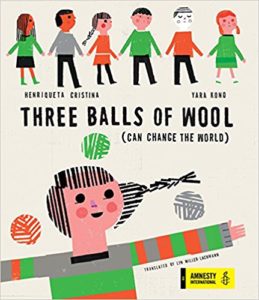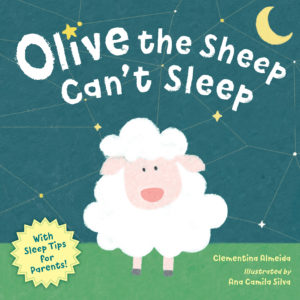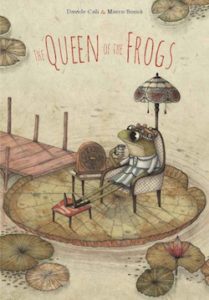Hello, Pirate Tree Readers. Most of you will recognize Lyn Miller-Lachmann as one of our most prolific reviewers. Lyn is a writer and translator as well as passionate and involved reviewer and lover of children’s and young adult literature, and a force in the movement for more diverse books. She has recently had a number of picture books published where she was the translator, not the author, and I wanted to take a little time to interview her so we could celebrate these successes. So here it is!
Your writing and publishing journey has taken a different path recently. Can you talk about where your publishing journey has taken you?
Lyn Miller-Lachmann:In 2014, shortly after returning from half a year in Portugal, I was invited to translate a wonderful picture book from Portuguese to English for Enchanted Lion, a small publisher in Brooklyn, New York, that specializes in international children’s books in translation. That book, The World in a Second, received a starred review from Kirkusand multiple distinctions. Since then, I’ve translated two other picture books from Portuguese into English for Enchanted Lion – Lines, Squiggles, Letters, Words and Three Balls of Wool (Can Change the World). I’ve also translated one book for Eerdmans, The Queen of the Frogs, and in August,Olive the Sheep Can’t Sleep, another book first published in Portugal, will come out from Charlesbridge.
You’ve mentioned that you’ve been publishing outside of the U.S. What has that been like? Why do you think non-U.S. publishers are interested in your work? What is going on with U.S. publishing that there has been less interest?
Lyn Miller-Lachmann: Recently, a Brazilian publisher hired me to translate a middle grade novel that portrays a refugee girl from Syria who journeys through Turkey and Greece to Italy, the other unaccompanied children she meets, and the challenges she faces along the way. The author is a prominent Brazilian journalist who covered the refugee crisis, and her novel presents this experience in a compelling and appealing way for young readers. I think that publishers outside the U.S. are more interested in translation, multilingual materials – the Brazilian publisher is bringing this book out in a trilingual (Portuguese, Spanish, and English) edition – and what’s going on in the rest of the world. In their reluctance to publish world literature in translation, and books with international settings, U.S. publishers reflect the insularity of the population as a whole. Unfortunately, this reinforcement of insularity – what some see as “American exceptionalism” – does us all a disservice, because our young people are ill-prepared to live in a world that does not center us.
Your most recent publications have been translations of Lusophone literature for U.S. publishers. What are the joys and trials of translation work? What do you feel translation work gives to you as an artist? How does it inform your work as a writer?
Lyn Miller-Lachmann: The greatest joy of this work is bringing stories that I value to a new audience and using my skills as a writer to show why these stories are both compelling and important. In terms of challenges, a big one is how to remain true to the author’s original intent while meeting the concerns and expectations of readers and gatekeepers in the U.S.
I’d hoped that my experience as a translator of picture books would help me to write picture books successfully, but so far, this hasn’t happened. However, my research into and understanding of the places and cultures depicted in those books has informed my own historical fiction, as has living part of each year in Portugal and traveling throughout Europe.
Can you please tell us about the translation you recently had published with Enchanted Lion and the one you have forthcoming with Charlesbridge?

Three Balls of Wool (can change the world) by Henriqueta Cristina and Yara Kono, translated by Lyn Miller-Lachmann
Lyn Miller-Lachmann: Last fall, Enchanted Lion published Three Balls of Wool (Can Change the World), a picture book written by Henriqueta Cristina, illustrated by Yara Kono, and published in Portugal by the internationally renowned small press Planeta Tangerina. Three Balls of Wool is based on the true story of a family forced to flee Portugal during the right-wing Salazar dictatorship, which made it difficult for poor and rural children to go to school because he believed that education would only cause people to question his theocratic regime. The family ends up in Communist Czechoslovakia on the eve of the 1968 Prague Spring, and while “all children go to school,” the country also lacks freedom, as reflected in the fact that sweaters are only available in three solid colors. The young narrator inspires her mother to unravel the wool sweaters and reknit them in a variety of patterns, and their efforts in turn inspire their Czech neighbors to do the same. The book shows the power of creativity and the way that immigrants change the places where they live for the better. In this way, Three Balls of Wool, set 50 years ago, has much to say about our present situation.
The book that I’ve translated for Charlesbridge due out in August,Olive the Sheep Can’t Sleep, combines a peaceful bedtime story with advice for parents to help their children sleep better. In this way, it’s both a children’s book and a how-to book for parents. The author, Clementina Almeida, is a well-known psychologist in Portugal with expertise in sleep disorders. In fact, her advice is good not only for children but for anyone needing to improve their sleep habits.
Why do you think it’s important for US readers to be given literature from Lusophone cultures? What are values or trends in those cultures that we can learn and grow from?
Lyn Miller-Lachmann: It’s important for U.S. readers to understand the perspectives of other people throughout the world, especially now that a quirk in our electoral system has given ultimate power to the most violent and xenophobic elements. Our democracy is at stake, as is the fate of the entire planet. The people of Portugal, Brazil, and the Lusophone countries of Africa have themselves struggled against colonialism and dictatorship, and their experiences have much to teach us. In terms of picture books, which is primarily what I’ve translated, children in the U.S. can see different types of families, including extended families in which grandparents and other elders are respected for their wisdom and experience. The trend in U.S. picture books to have the young person solve every problem often marginalizes or infantilizes elders when we need the energy and creativity of the young and the experience of elders to overcome the challenges that we face today.
You are so political in your writing and work. What sustains you through disappointments and struggles? What are some recent triumphs and joys that you’ve experienced that you would love to share with readers of The Pirate Tree?
Lyn Miller-Lachmann: I guess the main thing that sustains me is the idea that I’m not alone, and a lot of good and brave people are working together on these issues. I’m particularly encouraged by the movement for diverse books and Own Voices in children’s literature and see translation as part of bringing Own Voices authors and illustrators to readers in the U.S. I think we still have a long way to go, however, and we have to be constantly vigilant because it’s so easy to backslide, which has certainly happened in the broader political realm. Personally, I don’t have any big news to announce, though I’m still writing my own fiction and looking for books to translate. Maybe one day I will have news – these things can turn around quickly. At the same time, I’m excited about the stories I’m writing now, in which I’m going beyond traditional narrative techniques of YA (that first-person present-tense linear story) to experiment with the collective protagonist, parallel time lines, and, in my current work-in-progress, a novel in verse.


1 comment for “On Translation, Writing, and the State of U.S. Publishing: an interview with Lyn Miller-Lachmann”